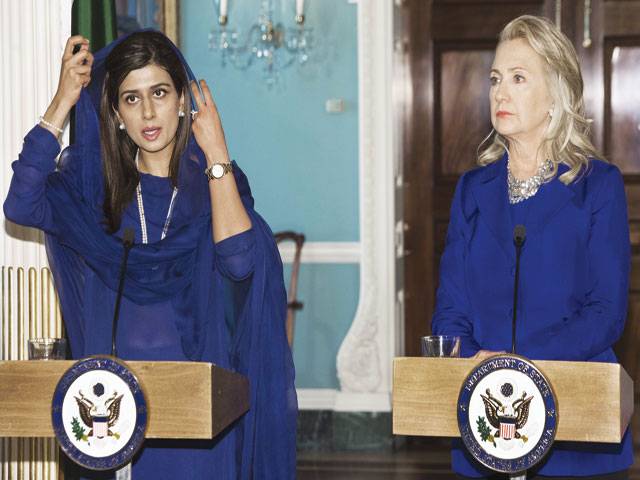WASHINGTON - In the wake of anti-America protests in many parts of the world over an anti-Islam film, the US needs to rethink about its concept of free speech, Foreign Minister Hina Rabbani Khar said.
“It is not good enough to say it’s free speech, it should be allowed. I think if this does provoke action against American citizens or Americans anywhere else in the world, then maybe we do need to rethink how much freedom is OK,” Hina told CNN in an interview.
“Is freedom to the extent of harming lives also OK? So, I think we need to find a way to manage this in a civilised manner in trying to bring all of our, you know, all of our minds together,” Hina said. “I think what we need is more tolerance for each other’s views. What we need is to be able to give mutual space for us to be able to demonstrate what is culturally, religiously important to us and not to hold each other, not to judge each other for that. “To give that space and to be able to create some space for ourselves. And really we have to be sensitive to religious sensitivities,” she said.
Hina said she does not want to ‘go deeper into discussion’ when asked one does not see massive demonstration or violence emerging because of ugly things that are said about other religions in the Arab and Muslim world, whether Christians or Jews.
Meanwhile, in another interview with an American news agency, Hina revealed that her country would soon hold confidential talks with the United States and Afghanistan to improve a three-way counterterrorism relationship beset by misunderstandings, including one over the Pakistan-based Haqqani network that Washington considers the greatest threat to Afghan stability. But she refused to say whether her government was ready to take any action against the militants.
Hina said senior officials from the three countries have been instructed to come up with a strategy for repairing cooperation that has suffered since Pak-US relations collapsed a year and half ago.
“There has to be a joint effort to determine who is a threat ... to determine how do we deal with those who are a threat, and how do we bring in those which are not,” said Hina and added “We are willing to work with anyone against any forces which are a threat to peace and stability.”
Hina dismissed the notion that Pakistan had any special responsibility to deal with the Haqqanis, lumping them in with the five million Afghan refugees in Pakistan.
“We would be happy to send each one of them back and live in peace in Afghanistan,” she said. But she refused to say whether her government would be willing in its three-way talks with the US and Afghanistan to commit to taking on the Haqqanis militarily.
The White House declined to comment on the counterterrorism talks, but U.S. officials familiar with the developments saw cause for optimism in the upcoming negotiations, which were worked out by President Barack Obama’s chief Afghanistan and Pakistan advisers, Marc Grossman and Doug Lute, as well as Pentagon envoy Peter Lavoy, in a meeting last week with Pakistani President Asif Ali Zardari and Army Chief Gen Ashfaq Parvez Kayani.
The ‘working group’ on the militant issue will include top US officials from the White House, State Department and Pentagon along with their Pakistani and Afghan counterparts, one current and one former US official said. They spoke on condition of anonymity because they were not authorised to discuss the talks publicly.
Hina called the formation of the new working group a ‘turning point’ that could produce progress on the other issues. But she made it clear that Islamabad wasn’t simply going to do Washington’s bidding, sharply criticising Panetta for his comments about supposed Pakistani military operations. She said Panetta was speaking “beyond his scope.”
“He is obviously welcome to talk about what military action will take place by American troops,” Hina said, but not Pakistan’s. And she pointed a finger back at the United States for the ‘hundreds’ of militants crossing the border from Afghanistan and ‘slaughtering our soldiers’, including 17 troops who were beheaded recently.
Hina hit back at criticism from the Obama administration and Congress over the treatment of Shakil Afridi, the doctor who is said to have run a fake vaccination programme for the CIA to collect DNA that might verify bin Laden’s presence at the compound in Abbottabad where US commandos found and killed him.
“He did not know who he was working for or what he was trying to achieve, so this ‘great man’ who was helping the world by assisting us to capture Osama bin Laden is a myth,” Hina said. “He was up for hire by anyone who was paying him,” she said, accusing him of links to a militant group and significantly setting back Pakistani efforts against polio.
“For us, he’s no hero, believe me,” she said. “He is somebody whose activity has endangered our children.”
Saturday, April 20, 2024
US needs to rethink on free speech: Hina

Pak economy improving, funds will be provided on request: IMF
9:57 PM | April 19, 2024
Minister advocates for IT growth with public-private collaboration
9:57 PM | April 19, 2024
Judges' letter: IHC seeks suggestions from all judges
9:55 PM | April 19, 2024
Formula 1 returns to China for Round 5
9:05 PM | April 19, 2024
Germany head coach Julian Nagelsmann extends contract till 2026 World Cup
9:00 PM | April 19, 2024
A Tense Neighbourhood
April 19, 2024
Dubai Underwater
April 19, 2024
X Debate Continues
April 19, 2024
Hepatitis Challenge
April 18, 2024
IMF Predictions
April 18, 2024
Kite tragedy
April 19, 2024
Discipline dilemma
April 19, 2024
Urgent plea
April 19, 2024
Justice denied
April 18, 2024
AI dilemmas unveiled
April 18, 2024
ePaper - Nawaiwaqt
Advertisement
Nawaiwaqt Group | Copyright © 2024





